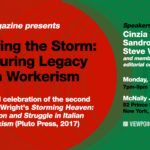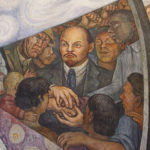
Crisis Theory
In 1977 Louis Althusser gave a famous speech in Venice on “the crisis of Marxism,” a thesis almost as scandalous as that of an epistemological break in Marx’s thought.

In 1977 Louis Althusser gave a famous speech in Venice on “the crisis of Marxism,” a thesis almost as scandalous as that of an epistemological break in Marx’s thought.

Black communist women in the U.S. used the Russian Revolution as intellectual and political framework in their struggle for fights for black women’s workplace rights, for domestic workers’ rights, and for rights within the private abode of the home.
Tags: Black Revolutionary Theory and the Peculiarities of American Marxism

Neoliberalism is not merely a set of economic policies, but a specific subjectivity and social relation, is reproduced not only from above but also from below, as migrants apply their own forms of calculation and logics of competition.

Join Viewpoint editors and contributors in New York on December 11th for a roundtable discussion with Steve Wright, to mark the release of the second edition of Storming Heaven from Pluto Press.

For the time being, borders are here to stay, but pushback is possible on both the fronts that matter: developing structures (both networks and norms) of solidarity in workplaces and communities, and recreating a consistent pole of anti-racist internationalism.

Despite this variety and historical change in the nature of sexual harassment, there has been remarkable continuity in the results – or perhaps one should say function – of sexual harassment. In the Lowell textile mills 150 years ago, as in insurance offices today, harassment is a major contributor to the consciousness that women have of themselves as workers, that men have of themselves, and that the sexes have toward each other.
Tags: From the Archives, Gender Sexuality Neighborhood Family

This text will propose that we approach Lenin not as a titan, but as an equal. Not the all-conquering revolutionary, the master tactician who always made the right decision, let alone the mighty party- or state-builder, but something more prosaic and relatable, though no less important: an organizer.

This troublesome phrase “dictatorship of the proletariat” is a messy lump of several poorly defined concepts. To understand the word “dictatorship” as we do now – as the opposite of democracy, an authoritarian regime in which an individual or minority group exerts violent and absolute power – is an anachronistic projection which totally distorts Marx’s usage.

If we want to call the “Lenin question” the problem of organization opened in the 1970s and today newly again before us, we can certainly do so, provided that it is understood that the watchword of Lenin does not mean nostalgia or organizational fetishism, but is rather a new solution for the problems that he had posed and victoriously resolved.

Only a radical change in the whole existence of the working class woman, in the conditions of her home and family life, as she acquires equal status with men in civil law will wipe out once and for all the barrier which to this day prevents the woman worker letting her forces flow freely into the class struggle.